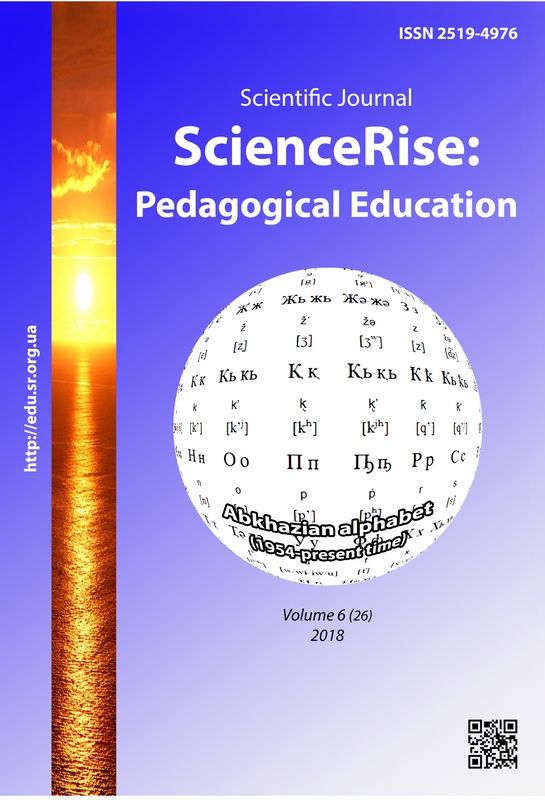Development model of professional competences in environmental monitoring in the system of postgraduate education
DOI:
https://doi.org/10.15587/2519-4984.2018.142019Keywords:
environmental monitoring, postgraduate education, model, professional competences, ecological specialists, principles of studyAbstract
During the study there was elaborated the structural-functional model of professional competences formation in the system of postgraduate education, and its main components (purpose, conceptual, content, operational and activity, control and regulative, resulting and diagnostic) were defined. This model is a generalized system with a system-innovative approach to improving theoretical knowledge and practical skills in the field of environmental monitoring, it reflects the content filling of the professional development of specialists, main scientific-methodological statements (principles, phenomena, processes) that may be corrected, corresponding to concrete requirements of the professional activity of specialists in the nature protection field. There are separated the components of training specialists in environmental monitoring: special and professional (informational, graphic, professional-motivational, gnostic, communicative, adaptive), scientific and research (methodological, analytic, prognostic), laboratory and practical (methodical, organizational, activity) that mutually add each other and are closely connected. There is characterized each component of the structural-functional model, and interconnections between them are demonstrated. There is demonstrated the methodology of formation of professional competences in environmental monitoring in the system of postgraduate education. It is established, that this model structures and improves formation stages of professional competences in ecological specialists, determines organizational-pedagogic conditions of this process. In particular the improvement of the content component, complex combination of different forms of study organization, creation of the innovative educational space in environmental monitoring in the system of postgraduate education. According to this model, professional competences in environment monitoring will be developed by workers of state, expert-control, inspection, departmental, scientific and educational, social institutions, production, nature protection enterprises, establishments, institutions, social organizations
References
- Mikheev, V. I. (2006). Modelirovanie i metody teorii izmereniy v pedagogike. Moscow: KomKniga, 200.
- Pirogova, O. V. (2004). Modelirovanie v obrazovanii. Innovatsii v obrazovanii, 5, 36–40.
- Vashchyk, T. I. (2005). Modeliuvannia u navchalno-vykhovnomu protsesi vyshchoi pedahohichnoi shkoly. Novi tekhnolohii navchannia, 41, 147–158.
- Riznyk, O. Ia. (2008). Lohichne prohramuvannia. Lviv: Vyd-vo NU «Lvivska politekhnika», 332.
- Fitsula, M. M. (2009). Pedahohika. Kyiv: Akademvydav, 560.
- Shamova, T. I., Davydenko, T. M. (2001). Upravlenie obrazovatel'nym protsessom v adaptivnoy shkole. Moscow: Pedagogicheskiy poisk, 384.
- Kharbatovych, S. V. (2012). Teoretychni aspekty modeliuvannia yak metodu naukovoho doslidzhennia. Visnyk Chernihivskoho natsionalnoho pedahohichnoho universytetu, 96, 184–188.
- Melnychenko, R. K., Tanska, V. V. (2013). Ekolohichna kompetentnist vchytelia yak peredumova zdiisnennia neperervnoi ekolohichnoi osvity i vykhovannia. Naukovi zapysky KDPU. Seriia: Problemy metodyky fizyko-matematychnoi i tekhnolohichnoi osvity, 4 (2), 271–275.
- Pustovit, N. A., Prutsakova, O. L. et. al. (2008). Formuvannia ekolohichnoi kompetentnosti shkoliariv. Kyiv: Pedahohichna dumka, 64.
- Biletska, H. A. (2012). Tendentsii i problemy rozvytku ekolohichnoi osvity. Suchasni informatsiini tekhnolohii ta innovatsiini metodyky navchannia v pidhotovtsi fakhivtsiv: metodolohiia, teoriia, dosvid, problemy, 30, 300–306.
Downloads
Published
How to Cite
Issue
Section
License
Copyright (c) 2018 Natalia Bordіug, Nataliіa Rideі

This work is licensed under a Creative Commons Attribution 4.0 International License.
Our journal abides by the Creative Commons CC BY copyright rights and permissions for open access journals.
Authors, who are published in this journal, agree to the following conditions:
1. The authors reserve the right to authorship of the work and pass the first publication right of this work to the journal under the terms of a Creative Commons CC BY, which allows others to freely distribute the published research with the obligatory reference to the authors of the original work and the first publication of the work in this journal.
2. The authors have the right to conclude separate supplement agreements that relate to non-exclusive work distribution in the form in which it has been published by the journal (for example, to upload the work to the online storage of the journal or publish it as part of a monograph), provided that the reference to the first publication of the work in this journal is included.







